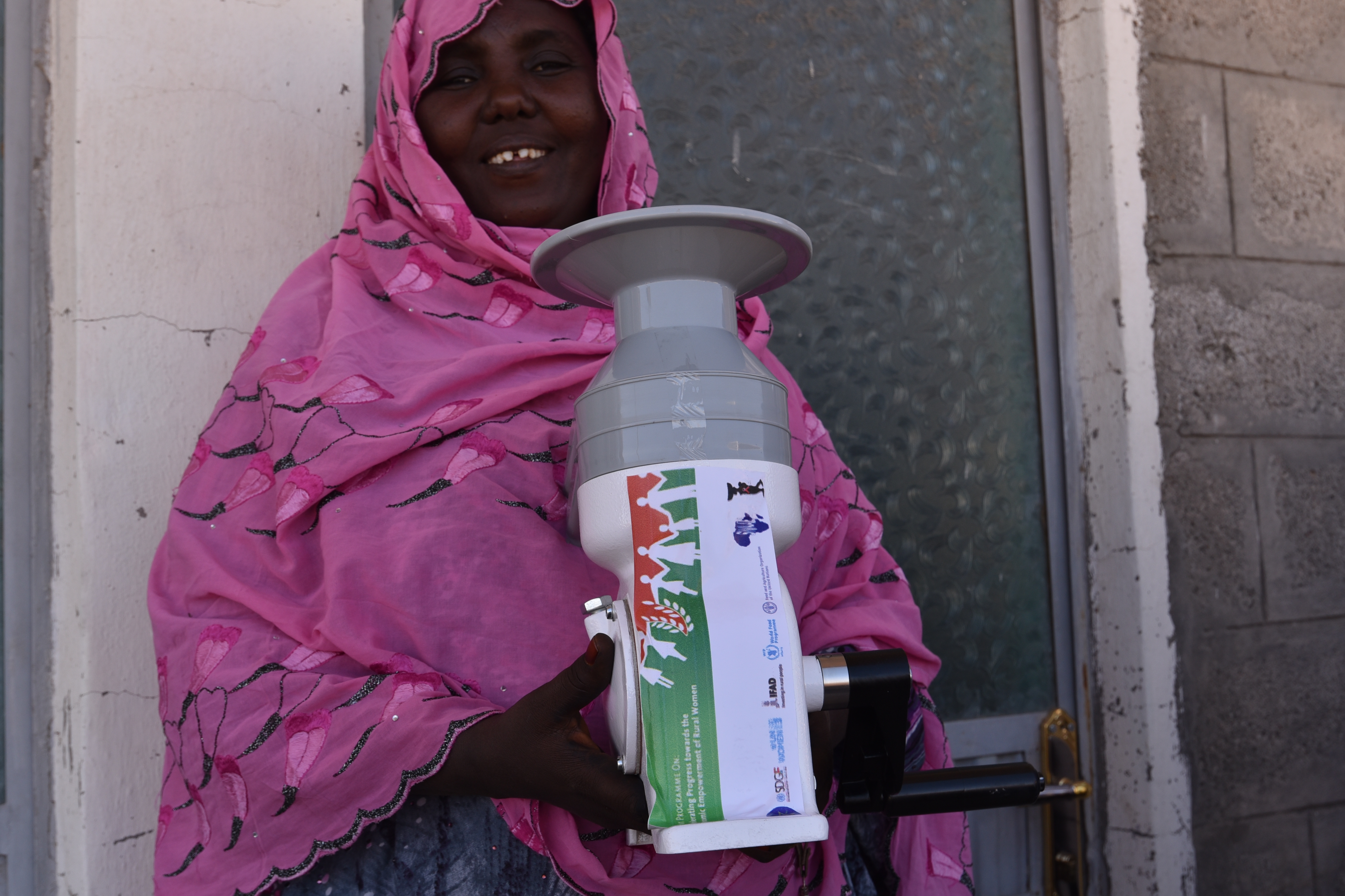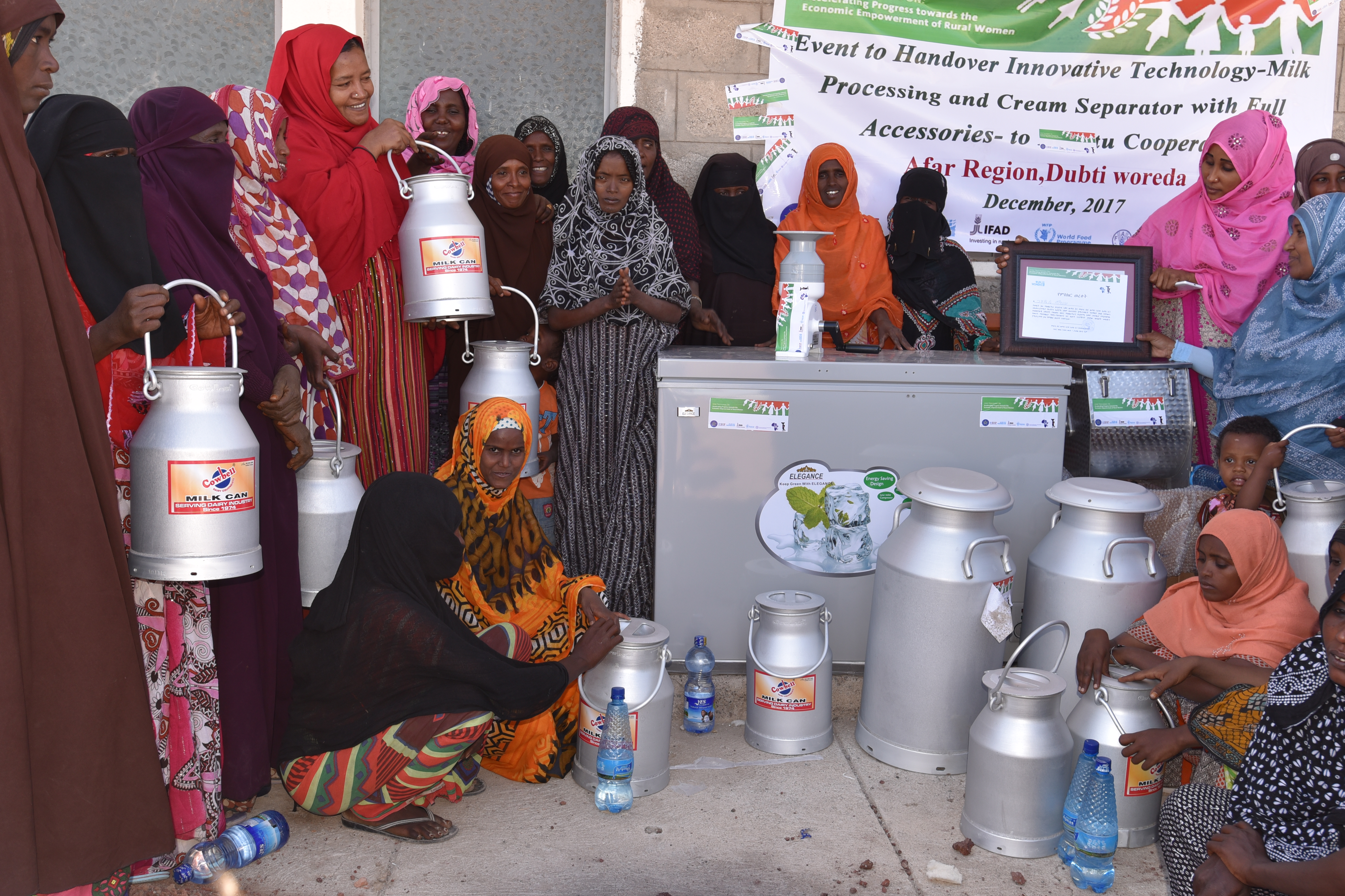From where I stand: Trainings, the turning point for my success in diversifying and sustaining my business
Maria Mohammed, 30 from Ayrolaf village in the Dubti district of the Afar region, Ethiopia, is one of the over 2,000 smallholder rural women farmers and agro-pastoralists beneficiaries of the JP RWEE.Date:
I was born and brought up in what is known as “the hottest places on earth”, the Afar region. I was raised up with a very basic pastoralist community’s life style to endure the harsh climate. For women, the only way of life that we were influenced to believe possible is marriage. I got married when I was only 16 years old and gave birth to my first child after a year. When I gave birth to my fifth child, my husband who used to work as a security guard at a sugar cane plantation could no longer afford to support the family.

I moved to Semera town in the region and started a small business of brewing traditional coffee and milk on the street. Although my daily income was only around 100Birr (4USD), after a few years, my hard work and quality service started to impress many in the surrounding. This is including one of the nearby regional government offices, which gave me the opportunity to provide a catering service in the office’s staff cafeteria. Having come from an informal business on the street, I thought I might not be fit. Fortunately, as one of the participants of the joint programme Rural Women Economic Empowerment (JP RWEE), I received trainings on basic business skills, cooperative management and leadership at the time when I got the offer to provide the catering service. These trainings were the turning point for the success in diversifying and sustaining my business.
When I was running my business on the street, the focus was on earning the daily ‘hand to mouth’ income. Today it is different as I am earning more and can differentiate my profit from the cost. At the cafeteria, together with my other two employees, I provide local food items and bottled drinking water along the coffee and milk, which I used to do on the street. From the service to the staff, I daily get 200-500Birr(7-18USD) profit. When I provide catering services during events, I get as high as 3,000Birr(111USD) per event. The improved income changed my family’s livelihood. I have built a better house in Semera town, purchased and installed a house cooling system to cope with the hot weather as well as started to send the children to school in the same town.
Through JP RWEE, I also received 15,000Birr(555USD) loan, which I used to diversify my business by supplying cold drinking water for school children. This happened by adding 3,000Birr(111USD) more from the income of the cafeteria business and bought a refrigerator, which I now use to cool and sell water for 1Birr(0.04USD) per litre at a primary school in the town. This contributes to improve the drinking water scarcity, especially in accessing cold drinking water. What pleases me the most about my job is not the income rather the fact that children in the community have affordable and better access to water and are able to cope with the environment and to focus on their studies.

For the last two years, I am the leader of the saving and credit cooperative known as Gandale. The cooperative is established through the JP RWEE in my village. One of the benefits of being in the cooperative is the accessibility to a market chain. Recently, through the JP RWEE, our cooperative received milk collecting and processing equipment. When the processing equipment starts to function, I believe that the cafeteria I manage will be among the potential clients as the demand for milk and milk products is high. The demand is the same in other cafeterias in the town. As the leader of the cooperative, I will make sure that the women put all their efforts to effectively use the equipment and to supply the milk and the milk products to meet the high demand, to increase their income and to improve their living. My vision for the cooperative is to breed its own milking cows and to supply the milk for processing direct rather than collecting from individuals. As the leader of the cooperative, I participated in trainings and provided technical support to members after attending various workshops through the JP RWEE. The achievement in developing a successful business, as the women cooperative leader, I believe I am role model for the women and they will follow up my steps towards success.
Maria Mohammed, 30 from Ayrolaf village in the Dubti district of the Afar region, Ethiopia, is one of the over 2,000 smallholder rural women farmers and agro-pastoralists beneficiaries of the JP RWEE. The programme is being implemented by the Government of Ethiopia in partnership with UN Women (coordinator), FAO, IFAD, WFP. The programme aims at accelerating the progress towards the economic empowerment of rural women in two pilot regions (Afar and Oromia) with an overall goal of securing rural women’s livelihoods and rights in the context of the Sustainable Development Goals (SDGs), mainly SDG 1 (No Poverty), SDG 2 (Zero Hunger), SDG 5 (Gender Equality) and SDG 8 (Decent Work & Economic Growth).
JP RWEE works on four specific outcomes: improvement of rural women’s food security and nutrition; increasing of their income to sustain their livelihood; enhancement of the rural women’s leadership and participation in their communities’ development and to secure a more gender responsive policy environment for economic empowerment of the rural women.
JP RWEE is financially supported by the Government of Spain, through Sustainable Development Goals Fund (SDG-F), Sweden and Norway.